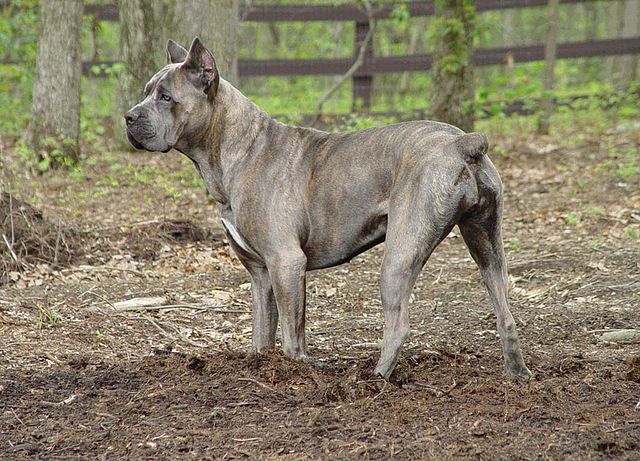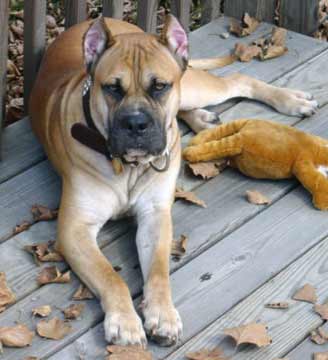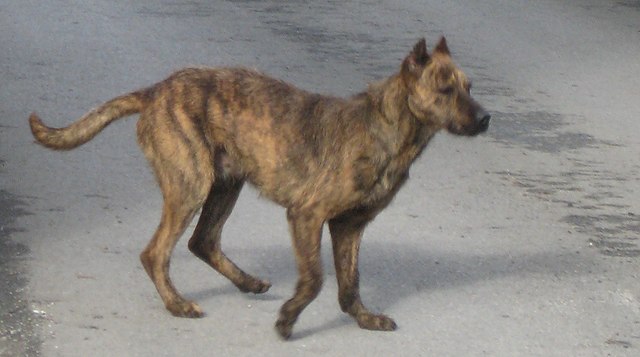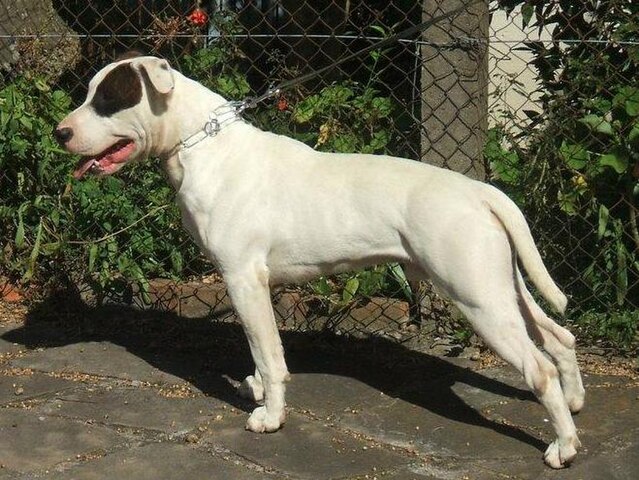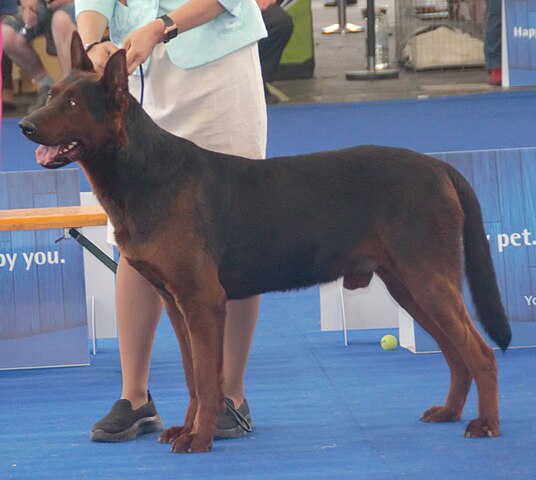The Cane Corso is a powerful Italian molosser, originally bred to be a multi-purpose farm dog with an emphasis on guard duties. Large and muscular, this breed is just as strong as he looks. Furthermore, the Corso has a serious “no-nonsense” personality which requires an owner who knows what they are doing. It must be stressed that this dog is not for everyone, and certainly not for someone who wants to buy a dog to make themselves look tough! When raised right, he is loyal and dedicated to his owners but will retain suspicion with strangers. In the right hands, he makes an excellent protection dog. In the wrong hands, he can quickly become a liability.
Because the Corso is naturally protective, he must be socialized very extensively while young – exposing him to as many people, places and animals as possible. This will ensure that the dog will not be fearful or aggressive toward new things, as well as help the development of a stable personality. As one of the more primitive breeds of guard dog, they are very aware and sensitive to their surroundings. As the dog grows older, he will become more and more aloof with strangers (as compared to fearful). By their teenage stage, many will show protective traits at home (their territory) and when out and about with their family. Corsi (the plural of Corso is Corsi) tend to be indifferent to strange dogs unless that other dog comes onto their territory.
Cane Corsi, in general, get along very well with kids. As a sensitive breed, however, they should never be subjected to children that tease them. If the teasing goes on for a long enough time period, there is a possibility that they will eventually get fed up and respond defensively. All interactions should be supervised to ensure that everyone is playing nicely (both child and dog). The Corso does have a prey drive and might try to chase and grab a smaller child in play, and this should never be allowed. When it comes to living with other dogs, there is a variability in the breed. Many do not do well living with another member of the same sex so an opposite-sex pair has a much better chance of working out.
As a working breed, the Corso must have a job in order to stay mentally sound. There are a number of different jobs that can be chosen for the dog, such as pulling a cart, tracking and/or protection sports – something for the dog to occupy both his body and mind. Just dropping the dog off at doggie daycare will not cut it, the key word is “work”! Dogs that are not given this important necessity will get bored and become destructive. Massive hole digging, eating up furniture, and the dangerous past-time of fence fighting with neighboring dogs are common ways in which Corsi will vent their frustration. Some will become unruly barkers which can be problematic for people with neighbors.
Many jobs involve some amount of training – either to teach the dog how to do the job, or to direct the dog while on the job. Whether or not their chosen job requires special training, basic obedience should always be taught as well. While all dogs need training, powerful breeds with assertive temperaments need it the most (like the Cane Corso). Along with formal obedience training and job-specific training, a set of household rules must be enforced at all times, lest the dog become the dominant member of the household. Luckily, most Corsi love to please their owners and take very well to obedience. The breed has a level head and calm demeanor when learning new things. Because they are very intelligent, it is recommended to start the training while they are still young and easier to physically manage. Corsi are also known for having great attention span, as well as an amazing ability to retain information for long periods of time.
Corsi were bred to work in the company of people and therefore make terrible outside-only dogs. They can be left alone for reasonable amounts of time but should never be left by themselves for 10 hours stretches of time on a regular basis. The breed has been known to develop the frustrating condition of separation anxiety. They are happiest when spending time with their owners, and will calmly stay by their human’s side for hours at a time. This is not a breed that is overly demonstrative of their affection, instead preferring to show their loyalty quietly and calmly. The Cane Corso has, in fact, a very sensitive soul. Most are empathetic to their owners’ emotions and will share in the moods of “their person”.
Despite their short coat, the Corso does shed moderately. This is because the coat is double, rather than single – meaning that the undercoat will come out in chunks when it gets loose. This is only a minor inconvenience for most, and usually off-set by the fact that grooming in general is very easy. Dogs that are brushed regularly (1-3 times a week) will not shed as much because the brush will pull the hair out rather than it falling out on its own.
Corsi need daily exercise to stay fit, with many breeders recommending an average of two miles a day. Walking or jogging (even bicycling) is often adequate, but other forms of exercise are great as well! Some members of the Mastiff family require much less of a workout than this breed, making the Corso a bigger time commitment than many of his cousins. This athletic canine, while fairly active outdoors, is much calmer inside the house however.
Being a large dog, the Corso does tend to eat a lot. A potential owner must consider the cost of owning a large breed, including bigger food bills and bigger vet bills. Hip dysplasia in particular is known to affect the breed, which will involve a costly procedure to fix. A smart owner will buy a puppy from parents who have been cleared of hip dysplasia themselves, in order to cut down the chances of the puppy inheriting it.
